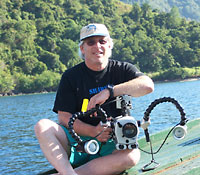A
very new release from Peachpit Press, Video Compression by Andy
Beach is well worth reading for literally anyone either new or
experienced to compression tools and techniques.
It used to be that editors edited
and compressionists compressed; they were almost separate fields
of endeavor. Much has changed over the years and now that much
of an editors' time is spent delivering material either as a
preview to clients for approval either on DVD or a media player,
or in final form onto numerous internet sites aiming for the
best possible image, compression skills and tools have become
as important to the producer as the skills needed to edit and
create that material. In addition, with the growth and use of
a plethora of HD and HDV codecs and the NLEs and players that
incorporate them, the field of compression has greatly increased
in its' complexity of standards and choices.
Andy Beach provides a considerably
up to date book which brings the reader a good distance towards
demystifying the multiple approaches to compression. Its' primary
goal is to enable you to understand not only the best approach
towards the subject, but to clearing up many of the differences,
pluses and minuses of the many compression applications on the
market.
The entire book is aimed at achieving
clarity for those who need to compress their media in an acceptable
and highly viewable format. He does this by first examining all
the dialogue and jargon that infuses this field breaking through
the barriers of semantics and attempting to clear the confusion.
This is primarily encompassed within the first 100 pages and,
I admit, while his writing style is clear and no nonsense, there
were times when my brain fogged over. I will have to re read
a few of those pages.
Following that, Andy Beach explores
and illustrates the use of most of the better-known encoders
and players and some I've not been aware of. Apple's Compressor,
QuickTime Player, Windows Media Player, Adobe Flash, Squeeze,
Real Player, Visual Hub are all given their fair space with plenty
of graphics and discussion as to their strengths and weaknesses,
advantages and disadvantages.
While Mr. Beach spends plenty of
time explaining the various theories and disparate views surrounding
compression, the most valuable asset within Real World Video
Compression's pages are his specific guidelines regarding the
use of these applications in order to achieve the best possible
result for your intended audience. Most of the book is devoted
to just these pragmatic uses of the many compression tools accompanied
with several color illustrations, suggestions for each and guidelines
for their use.
Maybe it was sheer luck and timing
but I was especially impressed with Mr. Beach's discussion of
the fall of HD and the segment regarding the, for now, current
supremacy of Blu Ray. It is both timely and on target.
Interspersed between many of the
chapters are interesting interviews with several established
compressionists. These interviews are more than just voyeuristic
insights into their lives but can be very much an educational
tool as we learn from them what apps and tools they prefer for
the different types of projects they work on.
For the individual new to compressing
video to DVD or to their various media players whether they be
iPods, Play stations or mobile phones; for the experienced user
still figuring out the best way to deliver media content to a
client; for the You Tube user who frets at the loss of resolution
when uploading, Andy Beach's Real World Compression will go a
long ways towards alleviating much of the insecurity and indecision
that often goes hand in hand with field of compression. High
marks for this book.
 Steve
Douglas is a certified Apple Pro for Final Cut Pro 6 and
underwater videographer. A winner of the 1999 Pacific Coast Underwater
Film Competition, 2003 IVIE competition, 2004 Los Angeles Underwater
Photographic competition, and the prestigious 2005 International
Beneath the Sea Film Competition, where he also won the Stan
Waterman Award for Excellence in Underwater Videography and 'Diver
of the Year', Steve was a safety diver on the feature film "The
Deep Blue Sea", contributed footage to the Seaworld Park's
Atlantis production, the History channel's MegaDisaster show,
a soon to be broadcast special on National Geographic and other
networks. Steve is one of the founding organizers of the San
Diego UnderSea Film Exhibition and leads both underwater filming
expeditions and African safaris with upcoming excursions to Indonesia,
Alaska, and the Coco Islands, Costa Rica in 2008, Kenyan safari
in Africa and the Red Sea for 2009, and Truk Lagoon in Micronesia
for 2010. Feel free to contact him if you are interested in joining
Steve on any of these exciting trips. www.worldfilmsandtravel.com
Steve
Douglas is a certified Apple Pro for Final Cut Pro 6 and
underwater videographer. A winner of the 1999 Pacific Coast Underwater
Film Competition, 2003 IVIE competition, 2004 Los Angeles Underwater
Photographic competition, and the prestigious 2005 International
Beneath the Sea Film Competition, where he also won the Stan
Waterman Award for Excellence in Underwater Videography and 'Diver
of the Year', Steve was a safety diver on the feature film "The
Deep Blue Sea", contributed footage to the Seaworld Park's
Atlantis production, the History channel's MegaDisaster show,
a soon to be broadcast special on National Geographic and other
networks. Steve is one of the founding organizers of the San
Diego UnderSea Film Exhibition and leads both underwater filming
expeditions and African safaris with upcoming excursions to Indonesia,
Alaska, and the Coco Islands, Costa Rica in 2008, Kenyan safari
in Africa and the Red Sea for 2009, and Truk Lagoon in Micronesia
for 2010. Feel free to contact him if you are interested in joining
Steve on any of these exciting trips. www.worldfilmsandtravel.com
copyright © Steve
Douglas 2008
This article first appeared on
www.kenstone.net and is reprinted here with permission.
All screen captures and textual references are the property and
trademark of their creators/owners/publishers.